RUSHing Around
Maurice Rotheroe catches one of Canada's finest as they take a break from RUSHing Around
Beat Instrumental, July 1979, transcribed by pwrwindows
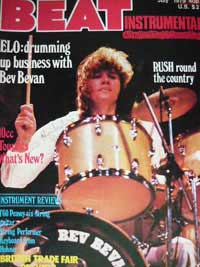
A more souped-up version of RUSH than has ever been seen on the road in these isles before, - that's what rock audiences have been seeing on this tour.
Pursuing the automotive metaphor, their design is not only more dynamic, their metalwork heavier, but the engine is also more finely tuned this time around. They themselves feel that they have now reached their most sophisticated level yet.
Birmingham, where I caught them on the first of a two-nighter gig, is fairly typical in the way that provincial fans over here have followed the RUSH flights of fantasy with increasing ardour. For this, their third booking at the Odeon, the tickets were snapped up faster and the people who got them displayed a greater familiarity and affinity for the bands albums than has been apparent on previous tours.
The three quiet, aesthetic (off-stage) Canadians reward this devotion with virtuoso manipulation of the new instrumental hardware they have with them on this occasion.
Cracking a can of lager, I talked to bassman and vocalist Geddy Lee about the way they had up-dated their range of equipment since the last tour. "Last time, I was learning how to play this gigantic Oberheim polyphonic, but I hadn't brought it into the show. Oberheims are one of the more up and coming synthesizers l think, in America anyway, but my set-up is unique.
"I have incorporated it into a giant of a beast with a mini-moog built in. There's two keyboards and I also have a set of Taurus pedals on the floor that are interfaced with the Oberheim which gives me the flexibility to be able to program 16 sounds into the memory bank of the Oberheim and to control these sounds with my feet.
"Or I have the option to use both the moog taurus sound or the Oberheim sound as desired.
"At the beginning of the tour I programmed my sounds into the Oberheim and the batteries that retain the memory are good for three years. Where maybe the Oberheim is travelling in a situation where it's very cold and the temperature drops below a certain point, the battery can't put out the five volts necessary to keep the memory charged, so sometimes memories are erased."
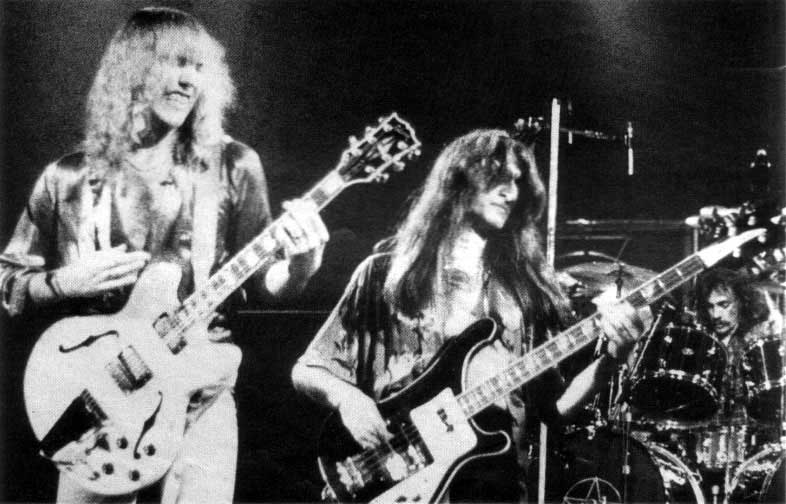
A hazardous business, clearly, and Geddy is not sure how cold it has to get before the Oberheim forgets what he's programmed in.
"It depends, you never really know. When I brought it over to England, just coming over in the hold of the plane was enough. Sometimes you out it in the back of a truck and you get to the next gig and the memories'll be gone.
"But I've got something that sorta saves my life - a cassette interface unit. It feeds the memories back in by way of binary codes and there are a series of bleeps and clicks and buzzes and all that takes place in 45 seconds flat.
"It goes 'frruup tick tick' and it's on the tape. So whenever I lose any of the programs all I have to do is hook up the interface and play this cassette into the memory bank and..." he snapped his fingers... "Magic! It's back in the Oberheim.
"Sure there are a lot of Oberheims around but my interface set-up is one of a kind. It took me six months to find somebody who could do it properly and this held me up. I couldn't use it on the last album 'Hemispheres' last year although it was supposed to be ready in time. But when I got it to the studio it just wouldn't work so l had to pass on it.
"The Oberheim and the pedals are all there individually on the album but not in the way that I had originally intended and not in the way that I'm using them on stage."
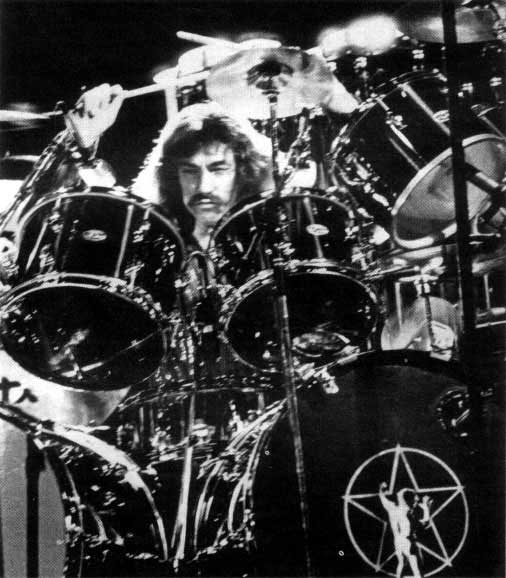
So Geddy's "beast" is one of the reasons why audiences have been getting vaster expanse of sound from RUSH on this tour.
It not only adds to the richness of material from "Hemispheres", in which the Oberheim was used for the first time, but it also enables the band to reproduce, authentically, older stuff such as "Passage To Bangkok" from the "2112" album, which could not be done before.
Geddy admits that he's not using it to the full in composition, though.
"I use it as a secondary method of writing because I don't feel that I'm astute enough or adept enough as a keyboardist to actually start composing songs around the instrument. I use it strictly as an over-dub instrument and I write melody lines and bass lines to go in among the music and around the main themes of the songs.
"This is because of my limited knowledge at this point of keyboard playing. It has the potential and right now the only thing I need to make that the ultimate instrument is my knowledge, and as that grows the more I can use it. There are aspects of its uniquity (ouch!) that will allow me and our three-piece band to go way beyond the limits of a three-place band."
Lead guitarist Alex Lifeson, meanwhile, makes much more use of acoustic guitars on stage now. A 12-string comes to the fore in "Closer To The Heart", for example, and he features classical in "Trees" and "A Farewell To Kings".
And he's been using a Roland guitar synthesizer on the current tour.
"l think it's an instrument that might feature more in the future because it has an incredibly broad sound," says Geddy. "Guitar synthesizers are still in the early stages and there are a lot of problems that we have to work on yet. Alex is just getting to know his, so as his knowledge of the instrument expands so will the sounds that he adds to the band."
All this additional equipment makes it increasingly difficult for audiences to identify the source of any particular sound, of course. This is perhaps demonstrated most dramatically during a gentle, melodic, outer-space section that has an almost ecclesiastical quality in the 'Hemispheres' suite. The lights were on Alex, and Geddy was at his keyboards putting vocals on top. It looked as if Geddy was playing along with Alex, with several different instruments creating a tapestry of sound.
In fact, it was all Alex and his Roland.
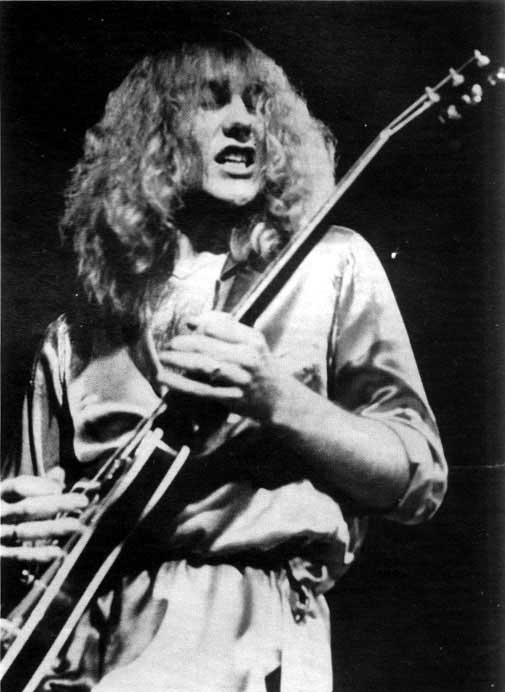
As for percussionist Nell Peart, well, I had an off-beat inquiry to make of him. After the show a budding young drummer in the audience had asked me what sort of stool Neil was using.
"I've tried them all and just can't get one that pivots the way his does." he said. I promised to find out.
Well, son, the news is bad. Neil sits on a regular Tama drum stool and there's nothing special about it. He's just a very agile guy, that's all.
There is nothing in Neil's kit, in fact, that can't be bought at any percussion store, but he does have rather more bits and pieces than average mounted on his immense tent-like riser.
"The wonderful professor of the drum kit", as Geddy calls him, is now using a gong, more bells and a whole new range of woodblocks.
"The audience never see half the things he's hitting. He also uses these really neat percussive bell things like pancakes, crotales. He's using a tympany on this tour which he wasn't using before, and timbales, with their Caribbean reggae sort of sound. And his technique has really progressed since the last tour."
A few of the sound effects that RUSH use on stage are taped, including the waterfall effect during one of Alex's quiet solos from "2112" and the intro to "Cygnus X-1".
"We also have on tape a couple of spots in the show once-in-a-lifetime sounds that happen in the studio that we just could not possibly reproduce".
In America and bigger halls, the band use film to go with the tapes, with 15-minute clips to illustrate sections of track in both "Hemispheres" and "2112". Intriguing, but that might just prove counter-productive since they are the first to agree that interpretation of their music is an intensely personal process between audience and band.
"That's why so few critics accept or understand our music because they try to put all sorts of interpretations on it," says Geddy. "I don't think you can summarize or put into words what we're putting over, because of this personal inter-reaction between us and our fans."
Although RUSH have fewer lights than many comparable groups, Howard Ungerleider's creative use of lighting is an integral part or the show. With a rather simple set-up he sets the atmosphere, builds shapes, points up the drama and adds an extra dimension to the sound, rather than merely keeping in time with the music.
Starting with "2112", RUSH have carried their fans via four albums on an epic journey of sci-fi fantasy, through black holes in space and beyond. It has been a closer than ever encounter with an infinite variety of experiences. Are they going to stay with this mystical image?
"On the last album, we sort of developed our science fiction conceptual thing to its ultimate, I think, and at this stage for us to continue exactly in that vein would be a little redundant," says Geddy.
"We have more instruments than most and we are trying to develop our total musicianship round these instruments. We are all learning from each other and trying to expand in such a way that we become better musicians - period. By achieving that we achieve the obvious goal which is to become a better bend, writing and playing better music.
"The more instruments we have the more we can add to the variety of our work because one thing we don't want to be is a typical three-piece band. Once we were that - and it was fine. A chugging rhythm section and the guitar player playing lead solos - and you just go for it. But we were too ambitious to stay like that.
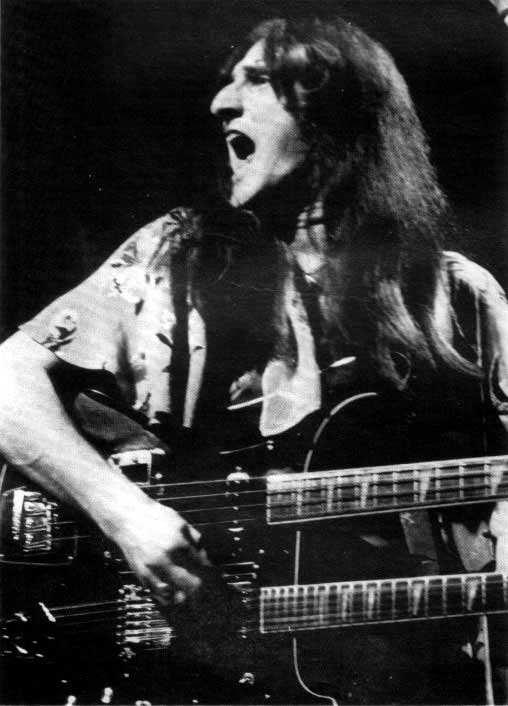
'"We say okay, there's no reason why the percussion can't be doing a melodic thing within a percussive arrangement and there's no reason that with me working with the percussionist I cannot play melodic bass lines intertwining with the rhythm section of the band. And there's no reason that Alex can't totally ignore what we're doing and play a third melody or a third type of melodic structure on top of those two layers that Neil and I are putting in.
"When we start writing we see where there's holes and think what instrument could fill them basically to make sure that something is happening all the time.
"Vocals in our band are just another instrument.
"The last album was more instrumental than any before and I think we'll continue in that. We had our first purely instrumental piece, "La Villa Strangiato" on our last album and I think that is a sort of jumping off point for the band. We learned a lot from that tune about what we can do without using lyrics. So I think on our next album that will be developed.
"But to get back to that mystical fantasy thing you originally asked me about. I can't tell you at this point how far that will actually continue because the next album isn't written yet. We've just begun to write and discuss where we're going to go.
"I can give you hints as to the structure but not really much about the content. What we're going for on the next album is perhaps a couple of 10-minute tunes, say, and then maybe four or five shorter tunes, because it has been a while since we've concentrated our efforts on writing shorter songs.
"On the last four albums, we've been working at doing 20-minute epic tunes and getting it right. The epic-type tracks are a strain, especially on stage, but they are also satisfying because they are incredibly indulgent and the audience seems to enjoy our indulgence as much as we do.
"On the next album, I think as musicians we just have to change direction for a time and see where we can take things. The next album will by no means be any more straightforward but l think it will be a little more different, using shorter pieces as a vehicle. It has been a while since we concentrated our energies on writing a five-minute tune and making that work with all the instruments we now have. It's almost leisure to say okay, we've got 20 minutes to work out in. Now we're asking ourselves, can we do in five minutes a complete piece that still has a lot of richness and variance or sound? We're going to use everything we've learned on the last seven albums and try to write more concise pieces.
"But this is conjecture at this point because there might be an idea that turns up and drives us wild and we might go after that. But I don't think there'll be one theme. For the time being, I think we've taken the conceptual thing to its limit."
It is very difficult to be blasé or indifferent to RUSH. You either accept what these guys do with sound and go the whole hog or you hate it. They have carried their early audiences with them as they matured and developed and they like to think of themselves as an idea and an outlet for ideas rather than a band, classified and pigeon-holed.
"We've tried to remain an idea and not to be branded as a band that does this or that sort of music. That is some of the reason why on the next album we will try to do different things from what we've been doing in the past. To stand still is a sign of complacency and complacency in a band in death."